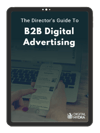Technology is evolving at an ever-increasing pace and there have never been more SaaS companies offering to solve the pain points of businesses. In fact, the UK’s SaaS market value is expected to reach £15 billion by 2025, with other leaders in Europe including Germany, France and Spain.
However, it’s not all smooth sailing - SaaS startups, and particularly those in the tech industry, have a staggeringly high rate of failure.

Take a look at the statistics below:
- 2,000 SaaS companies currently exist in the UK alone (although some sources put the number of startup SaaS companies at over 14,000), with 17,000 in the US and a whopping 40,000 worldwide. (source)
- 90% of SaaS start ups fail to make revenue and ultimately fold. One recurring reason for this failure is inadequate marketing and sales efforts. (source)
- Contrary to popular belief, 80% of start ups actually make it through the first two years of business. However, 45% fail within five years (this figure is 63% for the tech industry) and 65% fail in the first ten. (source)
A common factor that contributes to the failure of these businesses is a lack of direction or effort with marketing. Many think of digital marketing simply as the outbound promotion of a product or service online. However, the auditing and discovery needed to lay the foundations of a good digital marketing strategy can reveal weaknesses and insights - acting on this knowledge can greatly increase a businesses overall chances of success.
This guide will outline how digital marketing can help B2B SaaS companies scale up successfully. This includes a close look at the very specific challenges facing businesses at this stage and the way digital marketing can mitigate some of these.
Chapters:
- When should B2B SaaS companies start thinking about digital marketing?
- What challenges are unique to SaaS companies at this stage?
- How can digital marketing address these problems?
- FREE Digital Marketing Strategy Template
- Thinking about your first digital marketing hire?
At what point should B2B SaaS companies start thinking about digital marketing?
Given that the scope of digital marketing is fairly broad, the truthful answer to this is from the beginning!
Even in the extremely early stages of a business there are certain elements that you cannot do without. Think about your website, social media or email marketing to your database.
In terms of developing an established strategy and leaning into SEO and digital advertising more, immediately post startup or scale up is an ideal time to start.
 Free Download: The Director's Guide to B2B Digital Advertising
Free Download: The Director's Guide to B2B Digital Advertising
Get an overview of the key paid advertising options on channels like LinkedIn Ads and Google. Includes average costs, KPIs plus an example LinkedIn Ads campaign. Download Now.
What challenges are unique to SaaS companies at the post startup stage?
- Brand building: Smaller companies find themselves facing off against products from software giants or long-established players, creating a David and Goliath situation. This can create a very competitive landscape where it’s hard to gain brand visibility online.
- Decision making: At this stage businesses might have acquired extra financial resources, for example from funding or a couple of big clients. The challenge here is knowing where to spend it and understanding which of the endless options are going to give you the best ROI.
- Targeting and understanding your audience: At this stage businesses have often not yet put together essential frameworks for scaling up such as Ideal Customer Profiles. Additionally, there may be conflicting information coming from digital analytics and client-facing employees like sales.
- Attracting the right leads: If a business understands their target audience, the nature of B2B is such that it can still be difficult to get in front of the correct prospect.
- Nurturing leads and preventing funnel churn: Even businesses with success in lead generation often drop the ball later on in the buying journey. Frameworks for lead nurturing may not have been established, which allows prospects to go “cold” and slip through the cracks.
- Bad habits: During the chaotic startup phase, agility and speed often trumps elements like data hygiene and decent tracking practices. But failure to correct this leads to difficulty in attributing success correctly and making informed budget decisions.
- Long sales cycles: This is especially pertinent for SaaS businesses with a high average ticket price.
How can digital marketing help address these problems?
Addressing most of these problems starts with an audit of the existing business, which helps shed light on what they are doing well and what is lacking. Then this information can be leveraged to come up with a digital marketing strategy that helps mitigate these common issues.
Discovery & Auditing
Auditing helps you identify bad habits, lead churn, technical problems with your website before these elements get too big to correct. It also helps you identify what marketing efforts and channels so far have worked.
An end-to-end examination of your sales funnel will help identify opportunities for nurturing prospects more, for example in the form of email automation or retargeting via LinkedIn or the Google Display Network. This prevents valuable prospects from going cold and slipping through the cracks.
Digital Marketing Strategy
The auditing stage then provides the intelligence for forming your digital marketing strategy, which will help inform you where and how you could spend your budget. I can’t emphasise enough how critical this element is for business success going forward. 22% of start ups fail because of a poorly implemented marketing strategy.
FREE Digital Marketing Strategy Template
.webp?width=2508&height=982&name=cheat%20sheets%20image%20(1).webp)
To understand how the elements of a digital marketing strategy fit together and interact with the prospect at each stage of the buying journey, download my FREE Digital Marketing Strategy Template below. These cheat sheets are pre-populated with examples, but you can easily take them and make them your own.
 Digital Marketing Strategy Director's Cheat Sheets
Digital Marketing Strategy Director's Cheat Sheets
See how different elements of a strategy work in tandem to support business objectives, increase brand visibility and generate leads. Download Now.
Digital Advertising
The discovery stage will also more clearly identify your target audience, which will help you create digital advertising campaigns.
These can help you meet short-term goals and get you up and running with lead generation quickly. However, it’s important to find someone who really understands these channels to help, as mistakes in setup can result in a lot of wasted money. The devil is in the details!
SEO and Content Marketing
Meanwhile, ramping up your SEO effects through technical optimisation and a solid content strategy will help build your brand visibility online.
Strategically building a bank of blog posts and lead magnets that address your Ideal Customer Profile’s pain points at various stages in the buying cycle will help your business stand out in a crowded landscape.
As long as the content is high quality, prospects will come to view your brand as an authority in the industry. This increased trust will help decrease your sales cycles and minimise instances of prospects choosing a bigger-name competitor over your smaller business.

Tracking and Data Hygiene
A competent digital marketer can implement good tracking and data hygiene whilst it’s still possible. This means tracking and evaluating the success of your campaigns is easier in the future and these good practices can be taken forward as your business scales up.
Thinking about your first digital marketing hire
As mentioned above, a lot of these actions are best left to someone with experience in Digital Marketing, especially if they specialise in your niche or particular business stage. You have several options:
In-house
It may be tempting to hire a marketer in-house - besides, they would be fully committed to your business and building your brand!
However, many scale up companies make the error of hiring someone too junior and expecting them to research, plan and executive an entire digital marketing strategy alone.
This often leaves both parties frustrated, as discussed over in my post 4 growth marketing problems for start ups and scale ups.
If you want to hire someone in-house, make sure they have experience in strategy and an appropriate level of seniority.
Agencies
Agencies are an option that give you access to a wealth of knowledge, as most agencies have specialists available for every branch of digital marketing. But choose wisely, as they can be very expensive.
Make sure you thoroughly vet any agencies by looking at case studies, as well as reviews on 3rd party sites like G2. You can read more about selecting an agency in my other post here.
Consultants
A digital marketing consultant can help you with auditing the current state of your business, as well as planning and overseeing a digital marketing strategy.
Consultants have years, and sometimes decades, of strategic experience and will know the right questions to ask to maximise your business’ chances of success with digital marketing.
Although you do pay for this expertise, you are not obliged to have them on your books long term like an employee, with the other associated costs for in-house staff.
Get started today
Hopefully this guide has demonstrated how digital marketing can improve B2B SaaS companies’ chances of success. If you would like to take your business to the next level, book a free consultation with me and discover how we can make it happen.

.jpeg)